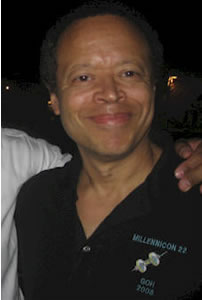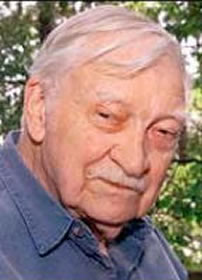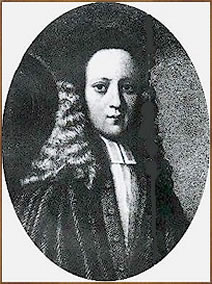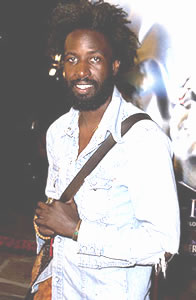De Nederlandse dichter, vertaler en journalist Jan Eijkelboom werd op 1 maart 1926 in Ridderkerk geboren. Zie ook mijn blog van 1 maart 2008 en ook mijn blog van 28 februari 2008.
Zondagochtend, Wielwijk
De nevel hield de geuren bij de grond.
Uit open kerkdeur kwam een walm
van wierook. Geheim sloop
rond het ziekenhuis de ether.
Bij het bejaardenhuis hing
een belofte in de lucht
van zevenhonderd karbonaden.
Jongere geuren waren niet voorradig.
Het park lag uitgebloeid.
De Opels der gelovigen waren
gestald. De roekelozer wagens
van ’t volk dat straks
ter voetbal trekken zou
stonden nog roerloos in de kou.
De vogels wachtten op de zon.
Tot dan: kyrie eleison.
Woordjes leren
Jongens, heb je verdriet,
sprak toen de leraar Grieks,
dan moet je woordjes leren, woordjes
leren. Hij knikte energiek
zodat er as viel op zijn vest,
maar dat was toch al vies.
Wij lachten half vertederd,
half meewarig, want tragiek
daar wist je alles van en hij,
heel oud, haast vijftig, niets.
En dat het overging als je maar
woordjes leerde, dat was iets
zo absurds, zo dolkomieks
dat het in omloop kwam als een
gevleugeld woord. Het klapwiekt
nu verdrietig om mij heen
omdat ik later woordjes leerde
waarmee je ’t monster kunt bezweren
en ik hem niet meer zeggen kan
hoe ik soms naar die stem verlang,
naar dat onhandige advies
Jan Eijkelboom (1 maart 1926 – 28 februari 2008)
De Oostenrijkse schrijver, dichter en schilder Franzobel werd geboren op 1 maart 1967 in Vöcklabruck. Zie ook mijn blog van 1 maart 2007 en ook mijn blog van 28 februari 2008.
Uit: Frau Hornaus im Hochstand
“-Waren Sie schon einmal vom Leben durchgeglüht?
-Wissen Sie, daß Jesus extra für Sie gestorben ist? Sie. Extra Sie hat er erlöst. Sie persönlich. Für Ihre Sünden hat er Leid ertragen. Für Ihren Platz im Paradies? Sie wurden persönlich auserwählt. Haben Sie kurz Zeit?
Und der Vater, noch vom Schlaf verwirrt, noch nicht ganz bei sich, bat zwei debil grinsende Persönchen herein. Aurelia und Zita paßten gut zu ihren Namen. In pfeffer- und salzfarbene Mäntel gehüllt, dicke Brillen im beflaumten Gesicht, dünne Lippen, abstehendes Ohrenpergament, dezent mit Gold behängt. Wanderschuhe. Nach Lavendel und chemischer Kleiderreinigung rochen sie. Abgelagertes, fast verkarstetes Leben in gebückten Gestalten.
-Meinetwegen setzen Sie sich halt. Der verknitterte Vater holte sich ein Bier, die beiden Damen lehnten ab.
-In der Bibel steht auf alles eine Antwort, sie nimmt uns das Gefühl des Ausgeliefertseins, nicht, wortwörtlich steht da alles drin. Wir sind Produkt des Schöpfungsakts. Auch Sie. Und bloß weil der Mensch gesündigt hat, hat Gott ihn vertrieben. In der Bibel stehts. Lesen Sie darin?
-Nein, brummte der Vater, ärgerlich, daß er so überrumpelt worden war, auch wollte er nicht sehen, was der Mensch verbrochen hatte. Erbsünde? Bibelrotz? Das war doch alles bloß ein Mist.
-Der Mensch hatte die Entscheidung, und der erste vollkommene Mensch, Adam, hat sich für die Lüge entschieden, für das Nichtgehorchen. Deshalb hat Gott ihn aus dem Paradies vertreiben müssen, weil er nicht geliebt hat, nicht gehorcht. Für die Sünde hat er sich entschieden, dieser Adam. Wir aber, wir dürfen keine Unzucht treiben. Gott weiß alles, was wir denken und tun. Seinen eigenen Sohn hat er geopfert, hat ihn extra ans Kreuz genagelt wegen uns. Nicht. Damit er uns von unseren Sünden befreit. Nicht.
-Was für Sünden denn?”

Franzobel (Vöcklabruck, 1 maart 1967)
De Engelse schrijver Jim Crace werd geboren op 1 maart 1946 in Forty Hill, Hertfordshire. Na zijn studie Engelse literatuur aan de University of London werkte hij vanaf 1968 voor de Voluntary Services Overseas in Soedan. Twee jaar later keerde hij terug en begon voor de BBC te werken. Van 1976 tot 1987 was hij freelance journalist voor o.a. The Daily Telegraph. In 1974 publiceerde hij zijn eerste fictie, Annie, California Plates, in The New Review. Daarna volgden talrijke short stories en hoorspelen.
Uit: The Devil’s Larder
„Someone has taken off — and lost — the label on the can. There are two glassy lines of glue with just a trace of stripped paper where the label was attached. The can’s batch number — RG2JD 19547 — is embossed on one of the ends. Top or bottom end? No one can tell what’s up or down. The metal isn’t very old.
They do not like to throw it out. It might be salmon — not cheap. Or tuna steaks. Or rings of syruped pineapple. Too good to waste. Guava halves. Lychees. Leek soup. Skinned Italian plum tomatoes. Of course, they ought to open up the can and have a look, and eat the contents there and then. Or plan a meal around it. It must be something that they like, or used to like. It’s in their larder. It had a label once. They chose it in the shop.
They shake the can up against their ears. They sniff at it. They compare it with the other cans inside the larder to find a match in size and shape. But still they cannot tell if it is beans or fruit or fish. They are like children with unopened birthday gifts. Will they be disappointed when they open up the can? Will it be what they want? Sometimes their humour is macabre: the contents are beyond description — baby flesh, sliced fingers, dog waste, worms, the venom of a hundred mambas — and that is why there is no label.“
Jim Crace (Forty Hill, 1 maart 1946)
De Zwitserse schrijver, cabaretier en liedjesmaker Franz Hohler werd geboren op 1 maart 1943 in Biel. Hij studeerde germanistiek en romanustiek in Zürich. Nog tijdens zijn studie voerde hij in 1965 zijn eerste soloprogramma pizzicato op. Het succes moedigde hem aan zijn studie op te geven en zich aan de kunst te wijden. Behalve cabaret schrijft hij romans, verhalen, toneelstukken, jeugdboeken en werk voor film en televisie.
Uit: Es klopft
„Seit einer Stunde lag er im Bett und konnte nicht einschla-fen.Auf dem Rücken nicht, auf dem Bauch nicht, auf der lin-ken Seite nicht, und auf der rechten auch nicht. Das war ihm schon lange nicht mehr passiert.Er war neunundfünfzig,und gewöhnlich war er am Abend so müde, dass er, nachdem er im Bett noch ein paar Zeilen in einem Buch gelesen hatte,die Nachttischlampe löschte, der Frau an seiner Seite einen Gute-Nacht-Wunsch zumurmelte und nach wenigen Atem-zügen einschlief.Erst wenn ihn seine Blase um zwei oder drei Uhr weckte, konnte es vorkommen, dass er den Schlaf nicht gleich wieder fand, dann stand er auf, nahm das Buch in die Hand und schlich sich leise aus dem gemeinsamen Schlafzim-mer in seinen Arbeitsraum, bettete sich dort auf seine Couch und las so lange, bis ihm die Augen zufielen.Er dachte an den morgigen Tag, es war ein Montag, das hieß, dass ihn eine volle Praxis erwartete. Um halb elf waren sie beide zu Bett gegangen, nun zeigten die Leuchtziffern seiner Uhr schon fast Mitternacht, und er sah seine Ruhe-zeit dahinschrumpfen, denn morgens um sechs würde mit-leidlos der Wecker klingeln. Aufstehen und ins Arbeitszim-mer wechseln, mit dem Buch in der Hand? Er fürchtete,dadurch seine Frau zu wecken, und er fürchtete ihre Frage,ob er nicht schlafen könne. Warum, würde sie dann fragen,warum kannst du nicht schlafen? Dann müsste er zu einer Notlüge greifen. Manchmal, wenn ihm ein Behandlungsfehler unterlaufen war oder wenn sich eine folgenschwere Komplikation eingestellt hatte, was zum Glück selten vor-kam, stand der Patient nachts plötzlich vor ihm mit seinem ganzen Unglück und wollte ihn nicht in den Schlaf entlasse
n.Für solche Fälle hatte er ein Schächtelchen Rohypnol in sei-ner Hausapotheke, aber er hasste es, wenn er sich betäuben musste,und zudem war er mit der Dosierung nie ganz sicher.“

Franz Hohler (Biel, 1 maart 1943)
De Franstalige, Zwitserse schrijver Jacques Chessex werd geboren op 1 maart 1934 in Payerne. Hij studeerde geesteswetenschappen in Lausanne en werd daar toen leraar Frans aan het gymnasium. Voor zijn roman L’ogre kreeg hij in 1973 als eerste niet Fransman de Prix Goncourt.
Uit: L’économie du ciel (2003)
“Quand j’ai commencé à comprendre que la cause de la mort de mon père n’était pas celle que j’avais crue pendant une trentaine d’années, la fondant, l’expliquant, souvent écrivant sur elle, j’ai repoussé cette nouvelle version comme une faute contre sa mémoire.
Cela s’est fait silencieusement. D’abord j’ai revu certains lieux. Un chemin dégagé peu à peu de la ouate de la mémoire, où mon père apparaissait un matin que je revenais de l’école sur la route que je prenais deux fois par jour pour rentrer à la maison, chemin d’où il sortait ce jour-là, chapeauté de brun, à vrai dire le chapeau bas sur l’œil et le col du manteau relevé.
Chemin qu’à ma connaissance il n’empruntait que depuis qu’il donnait des leçons à Vlasta, la jeune fille tchèque recueillie par les services de l’assistance publique aux réfugiés de guerre et placée chez la vieille femme qui habitait la dernière maison tout en haut de la pente, un immeuble de trois étages qui donnait sur une cour bétonnée devant les champs vides. A une ou deux reprises j’avais vu la maison sans volets, les fenêtres sans rideaux, cube sale, déjà rongé, dans la campagne déserte. Et il n’y a pas de chemin après le cube. Il y a les champs, au loin des collines, aucune maison, aucun hameau en vue, rien que la terre grise des champs, les prairies basses, les bosses au loin des collines sur quoi souvent passe le cri des corneilles, ou le vent de cet automne où je vois surgir mon père à une heure qui n’est pas la sienne. Une heure où il est toujours à son bureau à diriger son école et le collège et le reste. Car il ne donne ses leçons à Vlasta qu’à la fin de l’après-midi, deux ou trois fois par semaine, et de toute façon à cette heure-là, dix ou onze heures du matin, Vlasta est dans sa classe au collège avec les autres élèves du cours.”

Jacques Chessex (Payerne, 1 maart 1934)
De Britse schrijver Giles Lytton Strachey werd geboren op 1 maart 1880 in Londen. Zie ook mijn blog van 1 maart 2007 en ook mijn blog van 28 februari 2008.
Uit: The Letters of Lytton Strachey
„To Leonard Woolf, February 19, 1909
“The day before yesterday I proposed to Virginia. As I did it, I saw that it would be death if she accepted me, and I managed, of course, to get out of it before the end of the conversation. The worst of it was that as the conversations went on, it became more and more obvious that the whole thing was impossible. The lack of understanding was so terrific! And how can a virgin be expected to understand? You see she is her name. If I were either greater or less I could have done it and I could either have dominated and soared and at last made her completely mine, or I could have been contented to go without everything that makes life imp
ortant. Voilà! It was, as you may imagine, an amazing conversation. Her sense was absolute, and at times her supremacy was so great that I quavered.
I think there’s no doubt whatever that you ought to marry her. You would be great enough, and you’d have too the immense advantage of physical desire. I was in terror lest she should kiss me. If you came and proposed she’d accept. She really really would. ”
Lytton Strachey (1 maart 1880 – 21 januari 1932)
Geschilderd door Simon Bussy, 1904
De Japanse dichter en schrijver Ryūnosuke Akutagawa werd geboren op 1 maart 1892 in Tokio. Naar hem is de bekendste Japanse literatuurprijs genoemd. Omdat zijn moeder na zijn geboorte geestelijk ziek werd werd Akutagawa door zijn oom geadopteerd. Zijn eerste teksten publiceerde hij al tussen 1912 en 1916 toen hij aan de keizelijke universiteit Engelse literatuur studeerde. Na een baan als leraar begon hij voor de krant Ōsaka Mainichi te schrijven. Vanaf 1919 ging zijn gezondheid achteruit. Tegelijkertijd werd hij in zijn werk steeds realistischer en maatschappijkritischer. In 1927 pleegde hij zelfmoord door gif in te nemen.
Uit: Rashomon
„This was not only lust, as you might think. At that time if I’d had no other desire than lust, I’d surely not have minded knocking her down and running away. Then I wouldn’t have stained my sword with his blood. But the moment I gazed at her face in the dark grove, I decided not to leave there without killing him.
But I didn’t like to resort to unfair means to kill him. I untied him and told him to cross swords with me. (The rope that was found at the root of the cedar is the rope I dropped at the time.) Furious with anger, he drew his thick sword. And quick as thought, he sprang at me ferociously, without speaking a word. I needn’t tell you how our fight turned out. The twenty-third stroke… please remember this. I’m impressed with this fact still. Nobody under the sun has ever clashed swords with me twenty strokes. (A cheerful smile.)
When he fell, I turned toward her, lowering my blood-stained sword. But to my great astonishment she was gone.“
Ryūnosuke Akutagawa (2 maart 1892 – 24 juli 1927)
De Amerikaanse dichter, schrijver, acteur, rapper en musicus Saul Stacey Williams werd geboren in Newburgh, New York op 29 februari 1972. Zie ook mijn blog van 29 februari 2008.
Uit: Dead Emcee Scrolls: The Lost Teachings of Hip-Hop
„There is no music more powerful than hip-hop. No other music so purely demands an instant affirmative on such a global scale. When the beat drops, people nod their heads, “yes,” in the same way that they would in conversation with a loved one, a parent, professor, or minister. Instantaneously, the same mechanical gesture that occurs in moments of dialogue as a sign of agreement which subsequently, releases increased oxygen to the brain and, thus, broadens one’s ability to understand, becomes the symbolic and actual gesture that connects you to the beat. No other musical form has created such a raw and visceral connection to the heart while still incorporating various measures from other musical forms that then appeal to other aspects of the emotional core of an individual. Music speaks directly to the subconscious. The consciously simplified b
eat of the hip-hop drum speaks directly to the heart. The indigenous drumming of continental Africa is known to be primarily dense and quite often up-tempo. The drumming of the indigenous Americas, on the other hand, in its most common representation is primarily sparse and down-tempo. What happens when you put a mixer and cross-fader between those two cultural realities? What kind of rhythms and polyrhythms might you come up with? Perhaps one complex yet basic enough to synchronize the hearts of an entire generation.“

Saul Williams (Newburgh, 29 februari 1972)
Zie voor nog meer schrijvers van de 1e maart en de 29e februari ook mijn vorige blog van vandaag.


























